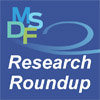MS Research Roundup: August 21, 2014
MS Therapeutics Consensus Paper; Dusting Off Old Drugs; Countdown to ACTRIM-ECTRIMS in Boston; Warming Up to the Ice Bucket Challenge
MS Research Roundup collects items of interest to multiple sclerosis researchers from around the Web. Send us your tips: tips@msdiscovery.org.
 Consensus Paper on MS Therapeutics
Consensus Paper on MS Therapeutics
Treat early, treat indefinitely, and switch when necessary. That’s the bottom line of a new consensus paper titled “The Use of Disease-Modifying Therapies in MS” (PDF), produced by the MS Coalition and reviewed by a panel of expert advisers. The report is a “summary of the treatment considerations that are all supported by a well-established evidence-base,” blogged Gavin Giovannoni, MBBCh, Ph.D. “What is important to note [is] that the treatment considerations are broad principles and [the authors] leave it up to the neurologist and MSer to decide on the exact course of action,” added Giovannoni, who was not involved in the report. Although none of the U.S.-approved therapies are “fully effective in stopping MS disease activity or disease progression,” the paper emphasizes that evidence points to the impact of early treatment on a range of disease factors, including delaying conversion to clinically definite MS from clinically isolated syndrome, reducing relapses, improving long-term clinical outcomes, and improving the quality of life. Patients and their clinicians need access to all available treatment options, the report said, especially in cases of very active disease, including adults, children, African-Americans, and people who cannot stick to a particular treatment regime. (MS Coalition, MS Research blog, National MS Society)
Repurposing Drugs for MS
It’s no secret that the timeline for novel drug development is long, not to mention expensive. One way to speed up and cut the costs of drug development is to tinker with something old rather than make something new. “Drug repositioning or repurposing holds many appeals,” reported a recent workshop summary from the Institute of Medicine. “Typically these drugs have been extensively profiled and studied in terms of safety, efficacy and toxicity, thereby decreasing the amount of preclinical research required. This streamlined process saves time and money, with repurposed drugs generally being approved in much shorter timelines (3-12 years) and at about 60% of the cost of typical development.” Indeed, many drugs have already been repurposed for MS, such as alemtuzumab, which was originally a cancer drug, and others are waiting to be tested for MS. Two more drugs with potential to be repurposed are on our radar. A group in New Zealand showed that the atypical antipsychotic, risperidone, has anti-inflammatory effects in experimental autoimmune encephalomyelitis, and IRX4204, a potential drug for prostate cancer, can also be a potential drug for remyelination. (IOM, MS Research Blog, PLOS ONE, Neurology Today)
#MSBoston2014
Let the countdown begin. So far, more than 6500 people have signed up for the world’s largest MS meeting, happening in Boston September 10 to 13. MSDF will be providing live research news coverage of the joint ACTRIMS-ECTRIMS meeting. We will be tweeting the sessions at @MSDForum, as well as providing in-depth news coverage at MSDiscovery.org. In a live webcast on September 13, the National MS Society will host a panel of experts who will review research advances from the meeting and answer your questions. Online registration for the meeting is open through Wednesday, September 3, after which people can sign up at the meeting itself. The session planner is live. The abstracts for most talks and posters will be online September 1, with the late-breaking news abstracts available September 10, according to the meeting website. MSDF is looking forward to meeting and catching up with the researchers and physicians who contribute to the cross-disciplinary conversation and help speed progress toward a cure. Come say "hi" to us and our nonprofit publisher, the Accelerated Cure Project, at booth 37 in the exhibit hall. (MSBoston2014, National MS Society)
Get Soaked
What did you do this summer? Hundreds of thousands of people, including Microsoft founder Bill Gates, have the same answer: Filmed myself pouring a bucket of ice water on my head to raise money for medical research into a devastating neurological disorder and posted it on social media, daring others to do the same. Various charities benefitted, but none as much as the ALS Association. As of today, the #IceBucketChallenge has surpassed $41.8 million in donations compared to $2.1 million during the same time period last year (July 29 to August 21). Facebook’s data team reported that the challenge originated in the Boston area, largely spurred by former Boston College baseball player Pete Frates, who used this particular challenge to raise money for amyotrophic lateral sclerosis (ALS), otherwise known as Lou Gehrig’s disease. The phenomenon sparked debate, but we like Forbes columnist Matthew Herper’s three reasons to applaud. 1. It raises money for ALS. 2. It encourages people to donate to charity in general. 3. It’s raising enough money to matter. And the impact could extend further. The way science works, the funded research of the central nervous system could provide insights into other neurological conditions, such as MS. (ALS Foundation, Boston Globe, Forbes)
Gavin Giovannoni, MBBCh, Ph.D., is a member of the MSDF Scientific Advisory Board. Accelerated Cure Project, MSDF’s nonprofit publisher, is a member organization of the MS Coalition.
Read other MS Research Roundups.


